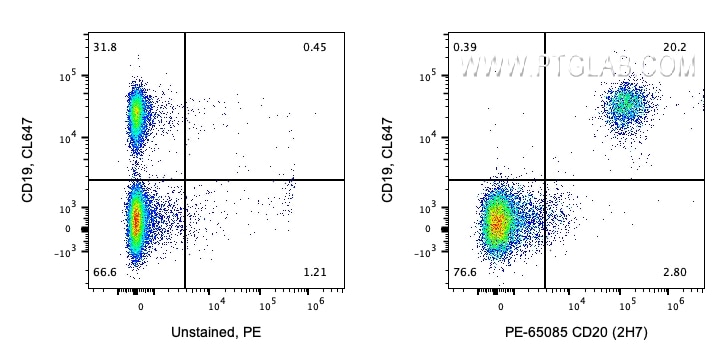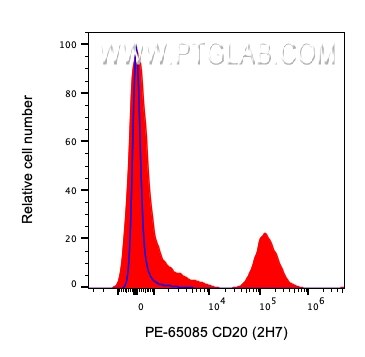Anticorps Monoclonal anti-CD20
CD20 Monoclonal Antibody for FC
Hôte / Isotype
Mouse / IgG2b, kappa
Réactivité testée
Humain
Applications
FC
Conjugaison
PE Fluorescent Dye
CloneNo.
2H7
N° de cat : PE-65085
Synonymes
Galerie de données de validation
Applications testées
| Résultats positifs en cytométrie | CMSP humaines, |
Dilution recommandée
| Application | Dilution |
|---|---|
| This reagent has been pre-titrated and tested for flow cytometric analysis. The suggested use of this reagent is 5 μl per 10^6 cells in a 100 µl suspension or 5 μl per 100 µl of whole blood. | |
| Sample-dependent, check data in validation data gallery | |
Informations sur le produit
PE-65085 cible CD20 dans les applications de FC et montre une réactivité avec des échantillons Humain
| Réactivité | Humain |
| Hôte / Isotype | Mouse / IgG2b, kappa |
| Clonalité | Monoclonal |
| Type | Anticorps |
| Immunogène | Lymphocytes B amygdaliennes humaines |
| Nom complet | membrane-spanning 4-domains, subfamily A, member 1 |
| Masse moléculaire calculée | 297 aa, 33 kDa |
| Numéro d’acquisition GenBank | BC002807 |
| Symbole du gène | MS4A1 |
| Identification du gène (NCBI) | 931 |
| Conjugaison | PE Fluorescent Dye |
| Excitation/Emission maxima wavelengths | 496 nm, 565 nm / 578 nm |
| Forme | Liquide |
| Méthode de purification | Purification par affinité |
| Tampon de stockage | PBS with 0.09% sodium azide and 0.5% BSA. |
| Conditions de stockage | Store at 2-8°C. Avoid exposure to light. Stable for one year after shipment. |
Informations générales
CD20 is a 33-37 kDa transmembrane phosphoprotein belonging to the membrane-spanning 4A family (PMID: 3260267; 16785532). CD20 is a B-lymphocyte surface molecule that is widely expressed during B-cell ontogeny, from early pre-B-cell developmental stages until final differentiation into plasma cells (PMID: 7524522). CD20 functions as calcium-permeable cation channel (PMID: 7684739). It is involved in the regulation of B-cell activation, proliferation and differentiation (PMID: 7524522).
Protocole
| Product Specific Protocols | |
|---|---|
| FC protocol for PE CD20 antibody PE-65085 | Download protocol |
| Standard Protocols | |
|---|---|
| Click here to view our Standard Protocols |



